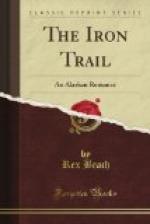“Poor devil!” said O’Neil. “I’m sorry. He had an unusual mind.”
Slater sniffed. “I think it’s pretty soft for him, myself. He’s made better than a stand-off—he lost his memory, but he saved his skin. It’s funny how some men can’t fall: if they slip on a banana-peel somebody shoves a cushion under ’em before they ’light. I never got the best of anything. If I dropped asleep in church my wife would divorce me and I’d go to the electric chair. Gordon robs widows and orphans, right and left, then ends up with a loving woman to take care of him in his old age. Why, if I even robbed a blind puppy of a biscuit I’d leave a thumb-print on his ear, or the dog’s mother would turn out to be a bloodhound. Anyhow, I’d spend my declining years nestled up to a rock-pile, with a mallet in my mit, and a low-browed gentleman scowling at me from the top of a wall. He’d lean on his shotgun and say, ’Hurry up, Fatty; it’s getting late and there’s a ton of oakum to pick.’ It just goes to show that some of us is born behind the game and never get even, while others, like Gordon, quit winner no matter how much they lose.” Having relieved himself of this fervid homily, “Happy Tom” unrolled a package of gum and thrust three sticks into his mouth. “Speaking of bad luck,” he continued, “when are you going to get married, Murray?”
O’Neil started. “Why—never. It isn’t the same kind of proposition as building a bridge, you know. There’s a little matter of youth and good looks that counts considerably in the marriage business. No woman would have an old chap like me.”
Slater took a mournful inventory of his chief’s person, then said doubtfully: “You might put it over, Murray. I ain’t strictly handsome, myself, but I did.”
As O’Neil slipped into his fur coat, after the fat man had slouched out, he caught sight of himself in the glass of his bureau and paused. He leaned forward and studied the care-worn countenance that peered forth at him, then shook his head. He saw that the hair was growing grayer; that the face was very plain, and—yes, unquestionably, it was no longer youthful. Of course, he didn’t feel old, but the evidence that he was so admitted of no disproof, and it was evidence of a sort which no woman could disregard. He turned from the glass with a qualm of disgust at his weakness in allowing himself to be influenced in the slightest by Tom’s suggestion.
For a week the ice rose slowly, a foot a day, and in spite of the greatest watchfulness it took the false-work with it here and there. But concentrated effort at the critical points saved the structure from serious injury. Then the jam in front of Jackson Glacier went out, at least in part, and the ice began to fall. Down it settled, smoothly, swiftly, until it rested once more upon the shores. It was still as firm as in midwinter, and showed no sign of breaking; nor had it moved down-stream a hair’s breadth. O’Neil gathered his forces for the final onslaught.




